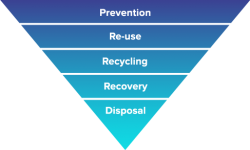Our top tips for having a summer sort out with the environment in mind…
Over the last few months, as a nation, we’ve spent more time in our houses than ever before. And, after a while, binge-watching Netflix shows can get a little tedious. So, we’ve all had to find ways to keep ourselves busy. And it seems like everyone’s had the same idea, as sort outs and DIY projects have become the go-to thing to do during lockdown. And why not? If you’re going to be spending time indoors you may as well make it look pretty right? But how do you do so in a way that’s good for the planet as well as your feng shui? To start you off on the right foot, here are our top tips for a sustainable declutter…
Before you do anything, you need the right tools. And, when it comes to a sustainable declutter, this triangle is the best tool you can get. From top to bottom, it details the most eco-friendly thing to do with those items you no longer want, and the least. Now, we’ll show you how this works in practice…

Reduce (Prevention) and Reuse
This means reducing the amount of waste you produce and reusing what you’ve already got. In terms of a declutter, this can be done by:
- Repairing – If you’ve got items that just need a quick fix, such as a teddy bear with one eye or a top with a small hole in, try repairing these before getting rid of them. You might be surprised at how much usage you can still get out of them with some handy needlework or a dab of glue.
- Upcycling – Another great way to reuse what you’ve already got, try turning it into something else! An old ladder can become a bookshelf, a jumper a cushion cover, and an old wine crate a herb planter – the possibilities are endless! And the end product? Something unique that no one else has.
- Donating – As they say, one man’s trash is another man’s treasure. So, see if friends and family want anything you’re getting rid of, donate to charity shops or advertise on sites like Freecycle. Just make sure your items are in good condition before doing so.
- Selling – If your items are in good condition, you might also want to try and make a little money from them. If you do, try and sell as near to you as possible to reduce the environmental costs of shipping. Use sites like eBay, Gumtree, Depop and Nextdoor, or, alternatively, go offline and set up your own garage sale or head to a local car boot.
Recycle
The next step on the hierarchy – recycling is for anything that can’t be reused or repaired, but is made up of materials that can be recycled. And this is where we come in. Via our home collections service, we come straight to your door, collect your unwanted items and recycle them for you. Here are some examples of what they get turned into:
- Paper and card (e.g. books, notepads and boxes) – can be recycled into new paper and card. For example, once read, newspapers and magazines can be turned back into latest edition newspapers and magazines in less than a week!
- Glass (e.g. jars and vases) – can be recycled into new glass products, like bottles and windows. And this process can happen again and again without the glass losing any quality!
- Wood (e.g. chest of drawers and beds) – can be recycled into chipboard and MDF, which are then used to make new wood products, like office furniture and kitchen cabinets. And, considering the planet’s already lost almost 50% of its trees because of felling, wood recycling is an important move in looking after our forests.
- Metals (e.g. washing machines and old bikes) – can be turned back into metal and used for all sorts of things, from food and drink cans to car body parts. For example, a can of your favourite fizzy drink can be back on the shelves ready to be sold again in just 6 weeks!
- Electronics (e.g. laptops and games consoles) – can be broken down into their component parts and then recycled. Good news when, as a nation, we’re throwing away the equivalent of 158,103 double decker buses’ worth of electronics every year!
- Plastic bottles (e.g. drinks bottles and toiletries containers) – can be turned back into plastic bottles or into clothing items, such as t-shirts and swimming costumes. And, with experts predicting there will be more plastic than fish in our oceans by 2050, recycling is a much-needed part of solving the plastics problem.
- Garden waste (e.g. grass cuttings and weeds) – made into compost, meaning it goes full circle, helping gardens to grow all over again!
Recover
Wherever you can, it’s best to find a way to reuse or recycle your unwanted items, but, if this isn’t possible, the next step down on the waste hierarchy is recovery. This is the process of turning waste into energy (Waste-to-Energy), such as electricity and heat. At Printwaste, we offer this as an eco-friendly alternative to landfill for items that are non-recyclable (e.g. black bag waste). When you have a declutter, it’s likely that some of your items won’t be recyclable, so recovery is a great way to ensure you send absolutely nothing to landfill. You also get the knowledge that your unwanted items have helped power houses across the UK, pretty cool right?
Having read the above, you’re all set and ready to go with your sustainable declutter, so we’ll leave you to get started. Good luck and just shout if you need us at the other end to come and collect your unwanted items for recycling or recovery!


